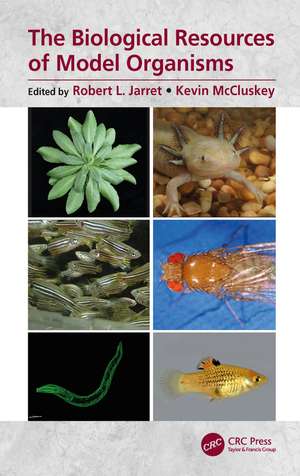The Biological Resources of Model Organisms
Editat de Robert L. Jarret, Kevin McCluskeyen Limba Engleză Hardback – 9 aug 2019
The chapters in this book attempt to provide a brief look at the individual organisms, how they came to be accepted as model organisms, the history of the individual collections, examples of how the organisms have been and are being used in scientific research, and a description of the facilities and procedures used to maintain them.
Features:
• Provides an in-depth look at the collections of 14 model organisms that have enabled innumerable scientific breakthroughs over decades, and that continue to do so.
• Includes detailed descriptions of the operating procedures used for the maintenance of each model organism collection.
• Discusses the holdings of the collections of model organisms and its relevance to past, current and future scientific research.
• Written by the leaders in the field of the management of model organisms.
Preț: 1223.30 lei
Preț vechi: 1491.83 lei
-18% Nou
Puncte Express: 1835
Preț estimativ în valută:
234.19€ • 244.35$ • 196.31£
234.19€ • 244.35$ • 196.31£
Carte tipărită la comandă
Livrare economică 13-27 martie
Preluare comenzi: 021 569.72.76
Specificații
ISBN-13: 9781138294615
ISBN-10: 1138294616
Pagini: 308
Ilustrații: 20 Tables, black and white; 30 Illustrations, black and white
Dimensiuni: 156 x 234 x 20 mm
Greutate: 0.6 kg
Ediția:1
Editura: CRC Press
Colecția CRC Press
ISBN-10: 1138294616
Pagini: 308
Ilustrații: 20 Tables, black and white; 30 Illustrations, black and white
Dimensiuni: 156 x 234 x 20 mm
Greutate: 0.6 kg
Ediția:1
Editura: CRC Press
Colecția CRC Press
Cuprins
1. Introduction to the Laboratory Axolotl and the Ambystoma Genetic Stock Center. 2. The Genetic Resources of Arabidopsis thaliana: The Arabidopsis Biological Resource Center. 3. The Bacillus Genetic Stock Center/Bacillus subtilis. 4. Genetic Resources of Rotifers in the Genus Brachionus. 5. The Caenorhabditis Genetics Center (CGC) and the Caenorhabditis elegans Natural Diversity Resource. 6. The Chlamydomonas Resource Center. 7. The Zebrafish International Resource Center. 8. The Bloomington Drosophila Stock Center: Management, Maintenance, Distribution, and Research. 9. The Fungal Genetics Stock Center Supporting Foundational and Emerging Model Systems. 10. The Peromyscus Genetic Stock Center. 11. The Tetrahymena Stock Center: A Versatile Research and Educational Resource. 12. The National Xenopus Resource. 13. Xiphophorus Fishes and the Xiphophorus Genetic Stock Center. 14. ATCC: The Biological Resource Center for the Future.
Notă biografică
Robert Jarret was born and raised in Franklin, Massachusetts and graduated from the local high school. After a tour with the US Navy, he attended Bridgewater State College majoring in Biology. Graduate studies were completed at Purdue University (M.S. and Ph.D.) and Colorado State University (MBA). He worked for a period of time at the Centro Agronomico Tropical de Investigacion y Ensenanza (CATIE) in Costa Rica and subsequently at the University of Florida (Homestead), eventually moving to his present position. His research activities combine field and laboratory activities and are often multi-disciplinary and typically focused on the conservation and characterization of genetic resources/diversity. In addition to conducting research, he curates collections of various crop and crop-related taxa. He currently resides in Griffin, Georgia.
Kevin McCluskey obtained his Bachelors and Masters degrees at Stanford University. After working in an MIT lab developing applications for a prototype Positron Emission Tomography system, he obtained his Doctorate in Botany and Plant Pathology at Oregon State where he pioneered the application of pulsed field gel electrophoresis to study the genomes of plant pathogenic fungi. Following a post-doctoral fellowship studying Fusarium at the University of Arizona, he accepted the position of Curator of the Fungal Genetics Stock Center. As curator, he developed the FGSC website and the databases that allow clients to identify and request materials. He is a scientific member of the US National Genetic Resources Advisory Council and also served two terms on the American Phytopathological Society Public Policy Board. Dr. McCluskey has published over 50 articles and chapters on fungal genetics and genomics. He retired from the FGSC in 2018 and is currently working in biotechnology.
Kevin McCluskey obtained his Bachelors and Masters degrees at Stanford University. After working in an MIT lab developing applications for a prototype Positron Emission Tomography system, he obtained his Doctorate in Botany and Plant Pathology at Oregon State where he pioneered the application of pulsed field gel electrophoresis to study the genomes of plant pathogenic fungi. Following a post-doctoral fellowship studying Fusarium at the University of Arizona, he accepted the position of Curator of the Fungal Genetics Stock Center. As curator, he developed the FGSC website and the databases that allow clients to identify and request materials. He is a scientific member of the US National Genetic Resources Advisory Council and also served two terms on the American Phytopathological Society Public Policy Board. Dr. McCluskey has published over 50 articles and chapters on fungal genetics and genomics. He retired from the FGSC in 2018 and is currently working in biotechnology.
Descriere
Bioresources are used by thousands of researchers and represent invaluable assets for large-scale experiments in a wide range of disciplines. These living materials include diverse species such as thale cress, maize, fruit flies, clawed frogs, zebrafish, green algae, tilapia, and sheep spanning across scientific disciplines. This book discusses the history, significance, and biodiversity of various genetic resources; managing existing bioresources through acquisition, maintenance, and distribution policies; characterization and evaluation of these resources; and future goals and improvements in handling them.
